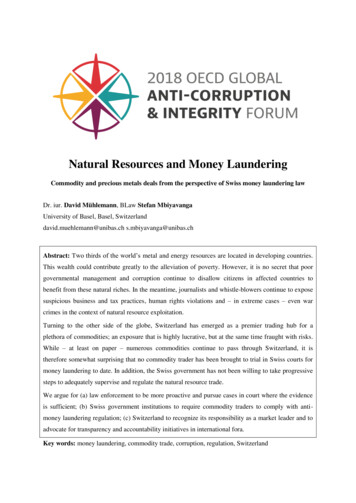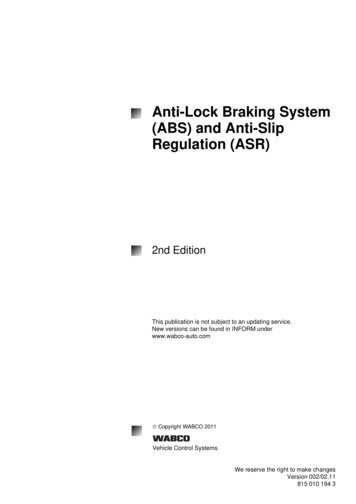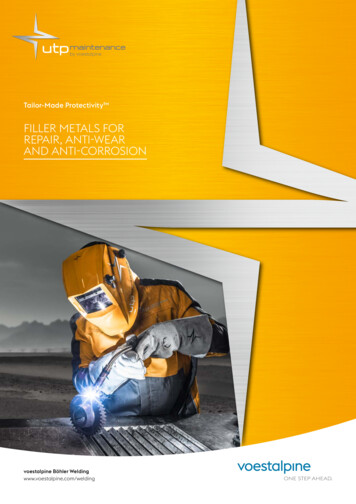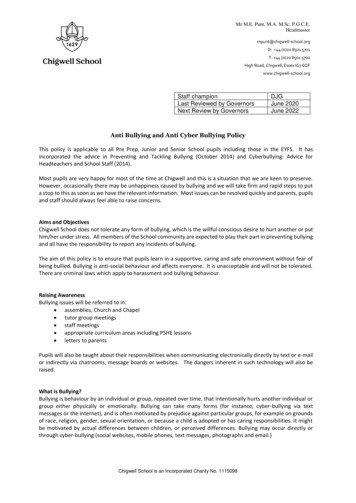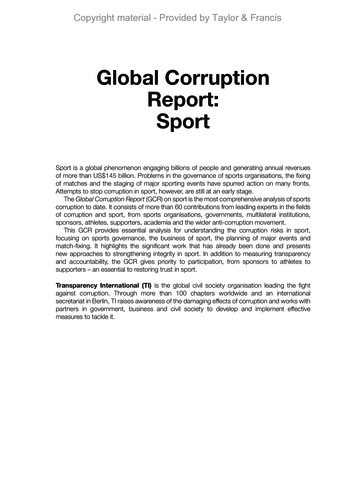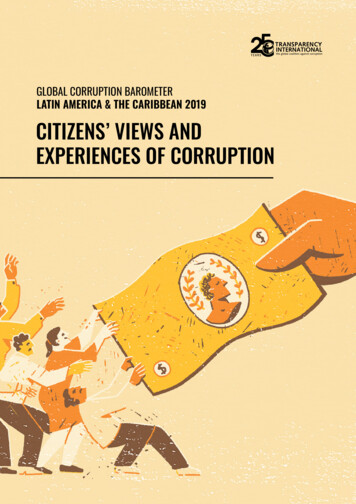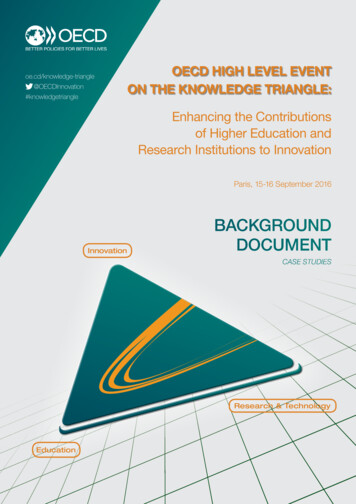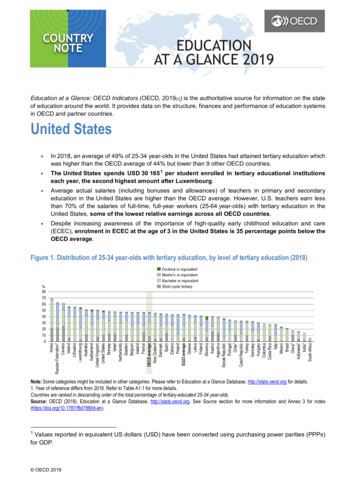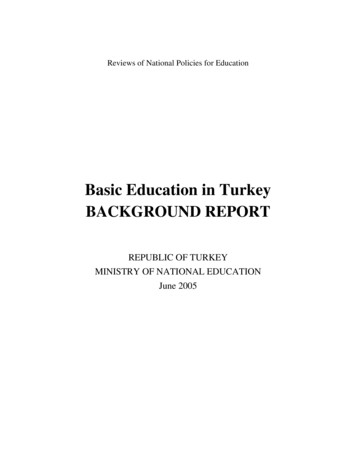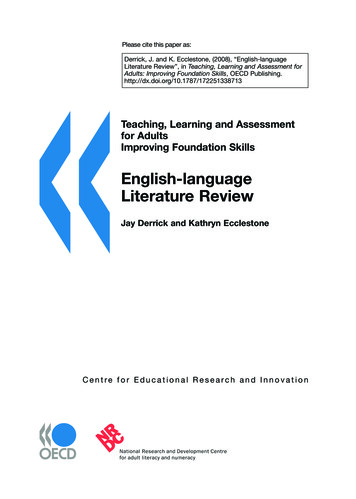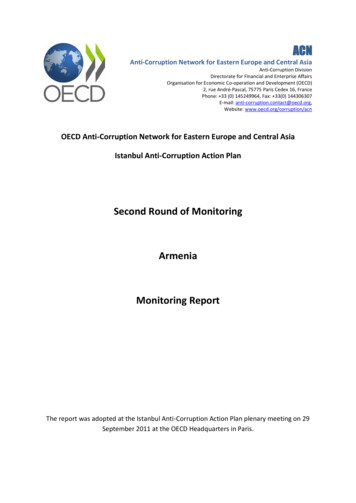
Transcription
ACNAnti-Corruption Network for Eastern Europe and Central AsiaAnti-Corruption DivisionDirectorate for Financial and Enterprise AffairsOrganisation for Economic Co-operation and Development (OECD)2, rue André-Pascal, 75775 Paris Cedex 16, FrancePhone: 33 (0) 145249964, Fax: 33(0) 144306307E-mail: anti-corruption.contact@oecd.org,Website: www.oecd.org/corruption/acnOECD Anti-Corruption Network for Eastern Europe and Central AsiaIstanbul Anti-Corruption Action PlanSecond Round of MonitoringArmeniaMonitoring ReportThe report was adopted at the Istanbul Anti-Corruption Action Plan plenary meeting on 29September 2011 at the OECD Headquarters in Paris.
ContentsExecutive Summary. 4Anti-Corruption Policy . 4Criminalisation of Corruption . 5Prevention of Corruption. 6Second Round of Monitoring . 8Country Background Information . 9Economic and Social Situation . 9Political structure . 9Trends in corruption . 101. Anti-Corruption policy . 111.1. POLITICAL WILL TO FIGHT CORRUPTION . 111.2. ANTI-CORRUPTION POLICY DOCUMENTS . 121.3. CORRUPTION SURVEYS . 151.4. PUBLIC PARTICIPATION . 171.5. RAISING AWARENESS AND PUBLIC EDUCATION . 191.6. SPECIALIZED ANTI-CORRUPTION POLICY AND COORDINATION BODIES . 211.7. PARTICIPATION IN INTERNATIONAL ANTI-CORRUPTION CONVENTIONS . 242. Criminalisation of Corruption. 252.1. – 2.2. OFFENCES AND ELEMENTS OF OFFENCE . 25Embezzlement, misappropriation or other diversion of property by a public official . 27Bribery in private sector . 27Abuse of functions. 28Illicit enrichment . 28Money-laundering. 28Liability of legal persons. 292.3. DEFINITION OF PUBLIC OFFICIAL. 312.4. SANCTIONS . 322.5. CONFISCATION . 322.6. IMMUNITIES AND STATUTE OF LIMITATIONS. 332.7. INTERNATIONAL COOPERATION AND MUTUAL LEGAL ASSISTANCE . 352.8. APPLICATION, INTERPRETATION AND PROCEDURE . 362.9. SPECIALIZED ANTI-CORRUPTION LAW-ENFORCEMENT BODIES . 382.10. STATISTICAL DATA ON ENFORCEMENT OF CRIMINAL LEGISLATION ON CORRUPTION. 413. Prevention of Corruption . 433.1. CORRUPTION PREVENTION INSTITUTIONS . 433.2. INTEGRITY OF PUBLIC SERVICE . 43Public service legal and institutional framework . 43Ethics and code of conduct . 45Recruitment and promotion . 47Remuneration . 48Conflict of interest and gifts . 50Asset declarations . 51Reporting of corruption. 532
Training . 543.3. TRANSPARENCY AND DISCRETION IN PUBLIC ADMINISTRATION . 55Anti-corruption screening of legal acts . 55Simplification of legislation . 55Administrative procedures . 563.4. FINANCIAL CONTROL AND AUDIT . 57External audit . 57Financial control, internal audit and inspection . 583.5. CORRUPTION IN PUBLIC PROCUREMENT . 593.6. ACCESS TO INFORMATION . 633.7. POLITICAL CORRUPTION . 66Financing of political parties and electoral campaigns . 67Transparency and control of party financing and electoral campaigns . 67Conflicts of interest of political officials . 68Relationships business-politics and lobbying . 693.8. CORRUPTION IN THE JUDICIARY . 70Independence . 70Career of judges . 70Assignment of cases . 71Ethical rules and disciplinary responsibility . 71Transparency of judicial decisions. 71Training of judges . 713.9. INTEGRITY IN THE PRIVATE SECTOR . 72Awareness raising and surveys . 72Accounting and auditing rules . 72Corporate ethics, government-private sector dialogue . 73Summary Table . 74Annex 1. Relevant Legislative Extracts. . 76Criminal Code of the Republic of Armenia (extracts) . 76Law on Public Service (extracts) . 83Law on Procurement (extracts) . 973
Executive SummaryThis report analyzes progress made in Armenia in developing anti-corruption reforms andimplementing recommendations received under the Istanbul Anti-Corruption Action Plan since thefirst monitoring round in 2006. The report also analyses recent developments and provides newrecommendations in three areas: anti-corruption policies; criminalisation of corruption; andprevention of corruption.Anti-Corruption PolicyIn recent years the political leadership in Armenia has regularly expressed its readiness to fightcorruption, including in public statements, various programmes, strategic documents and throughcarrying out some legal reforms. Despite some progress, the perception of corruption remains highin Armenia. Proper and effective implementation of policies and laws remain a major challenge.While the 2003 – 2007 Anti-corruption Strategy and Action Plan resulted in some legal andinstitutional changes, it did not have enough focus on practical measures, and monitoring of theirimplementation. The new 2009 – 2012 Anti-Corruption Strategy and Action Plan adopted in 2009 is amore comprehensive policy document, including 240 actions in a range of areas, includingprevention and law enforcement. The Strategy also provides for a new system of monitoring of itsimplementation and measures involving civil society. However, the report finds that the strategyremains on paper. A stronger leadership, a more holistic approach, permanent administrative andbudgetary support would be needed to implement this and other anti-corruption strategies andaction plans.An effective monitoring and evolution mechanism to assess progress made in implementation ofanti-corruption strategies and action plans is lacking. Coordination between the responsible bodiesand a central Secretariat is not systematic. Despite training provided for more than 50 employeesfrom 25 public agencies and ministries on monitoring, no permanent staff was appointed to monitorthe implementation of the strategy.The anti-corruption policy coordinating bodies created in 2004 remain weak. The Anti-corruptionCouncil and the Anti-Corruption Strategy Implementation Monitoring Commission are stillfunctioning, but their efforts lack a systematic approach and results are limited. There is an intentionto support anti-corruption efforts on a daily basis. It is key for Armenia to ensure a permanentSecretariat function to provide support for development, implementation and monitoring of anticorruption policies.Civil society organizations are increasingly active in Armenia. The report reflects numerous anticorruption activities conducted by civil society groups on their own or in co-operation with theGovernment. While the 2009 – 2012 Anti-Corruption Strategy stresses the importance of civilsociety’s participation in the fight against corruption, proposing to involve civil society in monitoringof the strategy and conducting surveys and evaluations, so far cooperation with civil society with theGovernment was very limited. Further measures to support and involve civil society and take jointanti-corruption activities are necessary.Overall public awareness of damages of corruption is increasing. Meanwhile, the perception of levelsof corruption has not decreased since the first round of monitoring. Corruption is still considered a4
major problem and citizens consider it is not addressed by the Government in a systematic manner.While the Government states in its programmes that building society’s trust is a priority, little isdone to raise awareness of the public on corruption by the Government. Numerous anti-corruptionawareness raising and education activities were organised by NGOs with donor funding.Criminalisation of CorruptionSince 2006 a number of legal changes have been introduced in Armenia in the area of criminalisationof corruption, the latest being in 2008. Armenia has made progress in meeting internationalstandards to criminalise corruption-related offences. In order to fully meet international standards,request and solicitation of an undue advantage and acceptance of an offer and of a promise of anundue advantage should be criminalised. In 2008 Armenia has criminalised trading in influence.However, the scope of this offence still fails to meet all the requirements of international standards,as it only covers passive side of the trading in influence, leaving out the active side in its entirety.Armenia has developed a draft law to further amend corruption-related offences aimed ataddressing concerns expressed in GRECO evaluation report and in this report.In 2008 Armenia has adopted a new Law on Combating money-laundering and financing ofterrorism. It addressed most of the concerns raised in the first round monitoring report in 2006. Inthe future, more emphasis should be given to the enforcement of the anti-money launderinglegislation.Armenia has still not introduced liability of legal persons for corruption offences with appropriatesanctions. Armenia should introduce criminal, civil or administrative liability, as it deemsappropriate.The report also finds that the statutory limitation periods for bribery offences remain too short toensure for effective investigation and prosecution. Possibilities for successful investigation andprosecution of corruption cases involving persons who enjoy immunity are also limited, as immunitydoes not constitute grounds for suspension of the statute of limitation.In 2010 Armenia has abolished immunities of parliamentary candidates, members of the Central,Regional and Local Election Commissions, candidate mayors and candidates to the local councils.Meanwhile, no progress has been reported by Armenia in regards to improvement of rules on liftingimmunities.Some progress is made to consolidate law enforcement framework and enhance furtherspecialisation in the fight against corruption: in 2008 a list of 31 corruption-related criminal offenceswas adopted; in 2007 prosecutors were stripped off of the investigative functions; a significantdevelopment was the establishment of the Special Investigative Service in 2008, entrusting it withpowers to conduct preliminary investigations of crimes committed by managerial officials within allthree branches of power.Nevertheless, the results in investigations and prosecutions of corruption crimes are very limited.Numbers of investigations, prosecutions and convictions on corruption crimes committed by highranking officials are very modest. Mostly middle level officials are being investigated and prosecutedfor corruption, including law enforcement officers, directors of the organizations, and heads ofbodies of local self-governance.5
Armenia should ensure that law enforcement agencies have necessary access to bank informationand other financial data for successful detecting and investigating corruption-related offences andextend the time period of preliminary investigations of such criminal cases.In the future it is necessary to further delineate competences among the criminal investigation andprosecution bodies, strengthen their collaboration and encourage them to address corruption in amore targeted and proactive manner, with the focus on high level officials, main risk areas in publicadministration, economy and the society.Prevention of CorruptionSince the first round of monitoring in 2006 Armenia has taken steps to establish rules andmechanisms to prevent corruption in the public service, in particular among high-ranking officials.The new Law on Public Service adopted on 26 May 2011 and entering into force on 1 January 2012, a“public sector ethics”, introduces rules on ethics and to prevent conflict of interest and corruption,including on accepting gifts, for all public service and a separate set of rules for high-ranking officials.Practical mechanisms should be put in place regarding conflicts of interest, incompatibilities andacceptance of gifts.To enforce the new rules, the law on Public Service foresees setting up an Ethics Commission forHigh-Ranking Officials to oversee application of this law by high-ranking officials and continuingsetting up ethics commission in individual public institutions. A number of codes of conduct andethics committees are already in place; however, their actual impact is limited. It is thereforeimportant to ensure that ethics commissions function properly and assess their effectiveness, inparticular in public institutions with high risk of corruption. Besides, a central coordinative body forthe whole public service could further promote the establishment and enforcement of commonintegrity standards and practices for the whole public service.Proper enforcement of income and asset declarations remains a challenge. Since 2001 an obligationto declare income and assets for public officials exists in Armenia. In 2006 a new Law on Asset andIncome Disclosure by Individuals was adopted. Little is known about its application andeffectiveness. The 2006 asset and income declarations will be abolished and a new property andincome declarations will be introduced as of 1 January 2012. The new declaration regime will onlyapply to high-ranking officials and their relatives. Instead of the tax administration, the EthicsCommission for High-Ranking Officials that needs to be set up will be admini
ACN Anti-Corruption Network for Eastern Europe and Central Asia Anti-Corruption Division Directorate for Financial and Enterprise Affairs Organisation for Economic Co-operation and Development (OECD) 2, rue André-Pascal, 75775 Paris Cedex 16, France Phone: 33 (0) 145249964, Fax: 33(0) 144306307 E
